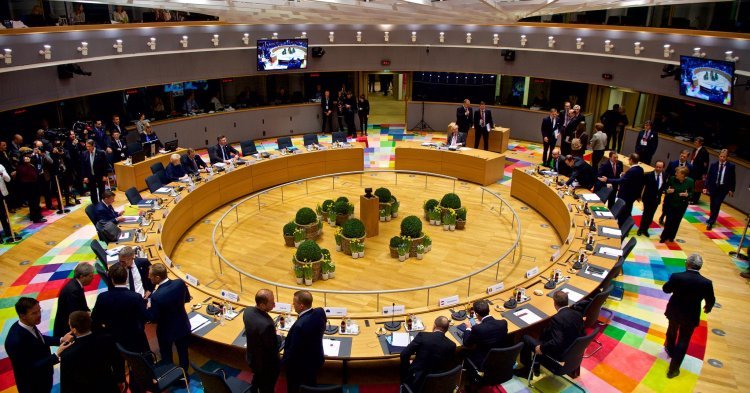For the author the “buggers of Europe” are together the States, the masters of the Union who have betrayed and abandoned the dreams of the Founding Fathers, as well as the demagogues who try to have us believe that a return to the past would solve all our problems.
The States at all the levels
The strongest and most serious myth of the EU concerns the role of the governments of the member States. Jean Quatremer explains at length how at every level it is more than ever the governments who control and pilot the EU. Those who have exerted the highest responsibilities and explain that we must “restore to the European Council” its pre-eminence, are only liars of the worst sort. The present EU is “more a confederation where the first and the last word come back to the States which compose it and give a verdict at the unanimity or by consensus”.
The designation of the members of the European Commission, of the Comity of permanent representatives, the Council, the Comity of experts, designated by the governments for the execution of decisions. It is national governments who have the control at every level. If in some countries the action of the latter is controlled by the parliaments of the States, it is not the case in France where “the chief of State considers that European policy is free from every normal process of deliberation”. As the democratic deficit is resorbed at the level of the European institutions with the progressive emergence – slowed down by successive French governments of the European Parliament; in France they have a preference for an authoritarism highlighted by the manner in which the country is involved in the governing of the Union.
The complexity of the Treaties and the policies adopted, belated and insufficient, characterise the EU due to a pre-eminent role of the States. “Europe is complex for the States are suspicious and mistrust each other”, the writer explains. In fact if the States accept to see some competences managed in common at the European level they wish to limit the margins of maneuvering of the EU to be sure to keep and preserve their control. This way the Treaties are excessively detailed and prescriptive.
The faults of the European Commission
It was after the presidency by Jacques Delors of the European Commission that the States even more increased their seizure on the common institutions notably by ensuring that the institution whose mission is the definition of the general interest may not act except as a Secretariat of the Council. The appointment of mediocre personalities such as Jacques Santer or José Manuel Barroso was the result of this desire to control.
The institution equally suffered considerably, as Jean Quatremer scathingly remarks, from the reform desired by the British Neil Kinnock on the organisation of the ’elite corps’ conscious of its mission to a managerial culture. This reform would have created an administration of management unable to make a link between the national interests to allow the general European interest to emerge.
The European Commission at the same time was attacked at the top with Presidents coming from the club of the chiefs of governments and servile with them, and at the bottom with a policy of recruiting that makes them a soulless organism devoid of a European vocation, making it unable to play its part and contribute to the European Council to define a goal or a course.
The main progress in recent years has come from the relationship between the Commission and the European Parliament. The latter has increased its control with the Santer-Cresson affair that Jean Quatremer himself had contributed to revealing. It has heard the Commissioners before their confirmation since 2004 and has been successful at dismissing Commissioners-designate deemed unfit. Our elected representatives have also succeeded in imposing that it be their candidate in the last European election that will be appointed to the Presidency of the Commission, that is to say the leader proposed by the party that has won the largest number of seats at the vote of the citizens. This democratic dynamic, made possible thanks to a reading of the Lisbon Treaty by our deputies, was not taken seriously in time by the governments who finally had to accept it. From now on it is undeniable that Europe has partially entered into the era of parliamentary democracy.
What alternatives are there?
It is easy to consider that this European edifice shaking about is the proof of a defect of construction and that it would have been more simple to pass thanks to a democratic constituting process in due form. So Jean Quatremer recalls that the political circumstances prevailing at the creation of the European Communities would have condemned that to failure. He also reminds us of the European Defence Community and its rejection by the French Parliament. If Europe is to be reformed, he dismantles the myth of the “Great Evening of redemption” that would be the alternative to its destruction for many critics but also the myth of interetatic cooperation which could be an alternative for some.
If a form of federal Europe founded on the Eurozone is presented as a desirable horizon, the priority is a clarification of responsibilities. In the absence of a unity of construction as Robert Schuman announced it the citizens of today are confronted with an excessive complexity. Jean Quatremer hopes for “five minutes of political courage” necessary to improve what is in existence, and the European Council starting with “the first black point and problem they have to deal with” but also the Commission that should be re-centered on its role of conception.
Why read “The buggers of Europe”?
Even if he crosschecks the criticisms of European Federalists about the present EU: intergovernmental, post-democratic and far from efficient, the work is certainly not a Federalist Manifesto. Jean Quatremer, as a journalist, first of all, tries to explain the pros and cons of this situation.
In this respect he writes a review of all the myths, lies and half-truths used by the nationalists from the right of the right, as well as on the left of the left, to discredit the European project and re-establish the facts. But unlike initiatives such as “the decoders of Europe” he does not content himself with a description of what is in existence, but also he puts in context how we have reached today’s situation and the insufficiencies that are in place today, calling out those who are responsible. The demanding observer’s eye that he keeps on the functioning of the EU offers an exceptionally interesting account.
This approach is particularly refreshing and it differs from the Europeanism which is first a façade of the institutions and the sweet sugary “pedagogy” without serious interest of some “pro-Europeans”. The militant federalist will find numerous marbles to contribute in solidifying his eurocritical dialogue. Indeed if the European project deserves our mobilisation in its favour, this mobilisation may only have as its object to radically transform the EU of today.


Follow the comments: |
|
